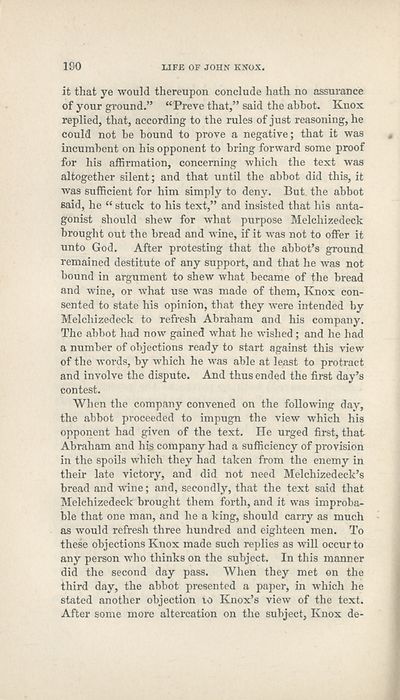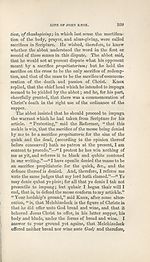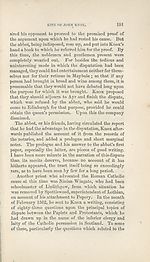Download files
Complete book:
Individual page:
Thumbnail gallery: Grid view | List view

190
LIFE OF JOHN KNOX.
it that ye would thereupon conclude hath no assurance
of your ground.” “Preve that,” said the abbot. Knox
replied, that, according to the rules of just reasoning, he
could not be bound to prove a negative; that it was
incumbent on his opponent to bring forward some proof
for his affirmation, concerning which the text was
altogether silent; and that until the abbot did this, it
was sufficient for him simply to deny. But the abbot
said, he “ stuck to his text,” and insisted that his anta¬
gonist should shew for what purpose Melchizedeck
brought out the bread and wine, if it was not to offer it
unto God. After protesting that the abbot’s ground
remained destitute of any support, and that he was not
bound in argument to shew what became of the bread
and wine, or what use was made of them, Knox con¬
sented to state his opinion, that they were intended by
Melchizedeck to refresh Abraham and his company.
The abbot had now gained what he wished; and he had
a number of objections ready to start against this view
of the words, by which he was able at least to protract
and involve the dispute. And thus ended the first day’s
contest.
When the company convened on the following day,
the abbot proceeded to impugn the view which his
opponent had given of the text. He urged first, that
Abraham and his company had a sufficiency of provision
in the spoils which they had taken from the enemy in
their late victory, and did not need Melchizedeck’s
bread and wine; and, secondly, that the text said that
Melchizedeck brought them forth, and it was improba¬
ble that one man, and he a king, should carry as much
as would refresh three hundred and eighteen men. To
these objections Knox made such replies as will occur to
any person who thinks on the subject. In this manner
did the second day pass. When they met on the
third day, the abbot presented a paper, in which he
stated another objection to Knox’s view of the text.
After some more altercation on the subject, Knox de-
LIFE OF JOHN KNOX.
it that ye would thereupon conclude hath no assurance
of your ground.” “Preve that,” said the abbot. Knox
replied, that, according to the rules of just reasoning, he
could not be bound to prove a negative; that it was
incumbent on his opponent to bring forward some proof
for his affirmation, concerning which the text was
altogether silent; and that until the abbot did this, it
was sufficient for him simply to deny. But the abbot
said, he “ stuck to his text,” and insisted that his anta¬
gonist should shew for what purpose Melchizedeck
brought out the bread and wine, if it was not to offer it
unto God. After protesting that the abbot’s ground
remained destitute of any support, and that he was not
bound in argument to shew what became of the bread
and wine, or what use was made of them, Knox con¬
sented to state his opinion, that they were intended by
Melchizedeck to refresh Abraham and his company.
The abbot had now gained what he wished; and he had
a number of objections ready to start against this view
of the words, by which he was able at least to protract
and involve the dispute. And thus ended the first day’s
contest.
When the company convened on the following day,
the abbot proceeded to impugn the view which his
opponent had given of the text. He urged first, that
Abraham and his company had a sufficiency of provision
in the spoils which they had taken from the enemy in
their late victory, and did not need Melchizedeck’s
bread and wine; and, secondly, that the text said that
Melchizedeck brought them forth, and it was improba¬
ble that one man, and he a king, should carry as much
as would refresh three hundred and eighteen men. To
these objections Knox made such replies as will occur to
any person who thinks on the subject. In this manner
did the second day pass. When they met on the
third day, the abbot presented a paper, in which he
stated another objection to Knox’s view of the text.
After some more altercation on the subject, Knox de-
Set display mode to:
![]() Universal Viewer |
Universal Viewer | ![]() Mirador |
Large image | Transcription
Mirador |
Large image | Transcription
| Antiquarian books of Scotland > Scotland/Scots > Life of John Knox ; and, The life of Alexander Henderson > (208) |
|---|
| Permanent URL | https://digital.nls.uk/131834800 |
|---|
| Description | Thousands of printed books from the Antiquarian Books of Scotland collection which dates from 1641 to the 1980s. The collection consists of 14,800 books which were published in Scotland or have a Scottish connection, e.g. through the author, printer or owner. Subjects covered include sport, education, diseases, adventure, occupations, Jacobites, politics and religion. Among the 29 languages represented are English, Gaelic, Italian, French, Russian and Swedish. |
|---|

